BELMONT — It’s a dog’s life bumped up to new levels of drama and intrigue — with greeting cards and checks from admirers, and pats and hot dog chunks from family members. His feats graced the pages of a national police dog magazine.
Three times he earned awards for ferreting out dangerous suspects. In his eight years with the Belmont Police Department, K-9 Vito searched for missing persons and guns in the woods, and drugs and drug dealers holed up in abandoned buildings. His ability to sniff and read emotions enabled him to sense when someone was up to no good — precious seconds before his human sidekick could pick up any signals.
On Wednesdays, like clockwork, he joined his partner, Lt. Evan Boulanger, for coffee with residents of Great Brook Village, a 55-plus community.
If Vito could speak, the stories he could tell.
As 2021 closes, this star achiever in the K-9 world, whose skills were recognized among police dogs across the U.S., is officially hanging up his collar at the Belmont Police Department after working cheek to jowl beside Boulanger for nearly a decade — an impressive stint in dog years. The two have slept in the same room, dog on the floor beside the man’s bed, ever since the 10-month-old Belgian Malinois arrived by plane from a working dog breeder in Slovakia.
It’s a weighty transition — perhaps more emotional than most retirees feel.
“I’ve had so many conversations with him,” said Boulanger, who will continue as Vito’s owner and full-time friend. “He’s like my priest, mentor and psychologist wrapped into one. I was with him more than my family. We survived two shootouts. We’ve seen the best and worst of humanity together.”
After years of low and high stakes assignments, an album of photos, newspaper clippings, and Christmas postcards of Vito and Boulanger commemorates their times together — which amount to almost every hour of every workday since 2014 — plus holidays and weekends.
“There’s a lot of people who might not like Officer Boulanger, but there’s a lot of people who like dogs,” said Boulanger, who grew accustomed to Belmont residents not remembering his name, but always knowing Vito’s.
For the lieutenant, the departure of the canine side of his team is coming at the right moment — theoretically, before the dog’s abilities start to wane or he gets injured on the job. Otherwise, it feels way to soon when Boulanger heads to work — especially to Vito.
“Who’s out in the car? It’s like his Taj Mahal,” said Boulanger. “Every morning he’ll run out and say, ‘Come on, Dad, let’s go.’”
Boulanger remembers the night he and his wife drove to Pennsylvania to meet the puppy after reviewing his biography and comments from trainers.
As Boulanger lay in bed in the hotel room where they spent their first night together, “There was a big wet snout sniffing my head in the middle of the night. I didn’t dare move.” During the wee hours, loud noises filtered in from a party down the hall. “He jumped on the bed, laid at our feet and started growling at the door.” At that point Boulanger knew a critical bond was set.
It grew over the years to include unspoken agreements, subtle signals only they could interpret and the ability to read each other’s body language — elements of teamwork that became life savers.
Boulanger recalls responding to an incident at a gas station. Vito started barking strangely – a low guttural sound, darting from side to side, rocking the patrol car. “It was a ‘Let me out of the car’ bark,” said Boulanger. The suspect lunged through the cruiser’s open window and grabbed a gun. Boulanger fired, and the man turned the gun on himself — a tragic outcome that could have been lethal for the officer had the dog not been there. Both went on administrative leave and found comfort in each other. “Nobody understands this like you and me,” Boulanger remembers telling Vito. “It was easier to talk to him than somebody else.”
In a separate incident, following a report of a fugitive hiding in a Belmont home, Vito sniffed a wall underneath a basement staircase then started barking and clawing. Boulanger was skeptical, but remembered what another K-9 handler had told him: Trust your dog. Boulanger grabbed a hammer and cracked the sheetrock. A voice inside said, “I’m coming out. Just don’t send in the dog.”
“K-9s are the best tool that handlers can have on their hip,” said Jenn Schaaff, executive director of the Working Dog Foundation in Raymond, which trained Vito and other K-9s currently with police handlers. “If we send in a dog, 90% of the time a suspect is going to give up or retreat. Even if a dog is on site, the bark is enough to scare you.”
A special job, a growing breed
There’s no reliable estimate of how many K-9s currently work for law enforcement agencies in New Hampshire. Their numbers are in flux as older dogs retire and newcomers are purchased and schooled. Municipal police departments, often through fundraising campaigns, try to raise enough donations to purchase an $8,000-$12,000 Dutch or German shepherd or Belgian Malinois — the preferred breeds for police work. Another $1,000-$2,000 may be required to professionally train them and their human teammates. Only about 2-5% of working dogs bred for this turn out to be suited for this career, without any fear of dark rooms or stairs, and an ability to stay calm and focused in crowds and around loud or disturbing noises, Boulanger said.
K-9 handlers in the Lakes Region say the number of working dogs at police departments in New Hampshire has grown in the last 20 years, as law enforcement evolves and taps the magic abilities of dogs to break the ice, elicit cooperation from witnesses, victims and defendants, and build trust in communities where there is little.
Over time, the jobs of police dogs (as opposed to comfort dogs — which also work at some police departments) have remained essentially the same. Their trade consists of narcotics detection and evidence recovery out in the field “of things that have been lost or scattered,” said Lt. Dustin Parent, a longtime K-9 handler for the Gilford Police Department. Tracking humans is a called-upon skill, “locating lost or wanted subjects” in buildings or by scouring large areas outdoors. “Cadaver dogs are trained specifically to find dead human beings,” said Parent.
Police dogs learn to detect a particular odor in shifting crowds, and tune out competing smells — as opposed to bloodhounds geared to tracking specific individuals.
According to research, dogs can identify seven different odors at one time, and process 250 parts per million compared to five parts per million for humans.
“Just their natural gift of smelling is something we use in every aspect of police work,” said Parent, who served as Gilford’s K-9 handler from 2005 to 2015. “Their ability to do things that humans can’t. Detection, apprehension, everything’s a game to them. They don’t bring fear into it like humans. Their nose is definitely their selling point in law enforcement.”
“If we walked in, we’d smell pizza. If Vito walked into a pizza place, he’d smell the sauce, the cheese, the dough and the person who baked it,” said Boulanger. From a tableau of scents, police dogs “build a two-dimensional picture in their brain. It’s amazing, the fact that we’re expelling skin cells and odors and I could use these dogs to sniff a chair you’ve been sitting in and have them locked in on that scent.”
On the bright side, Vito will live out his days as a treasured member of the Boulanger family, romping and hiking with his lifelong law enforcement buddy, his wife and son — and occasionally playing tracking games to keep his mind sharp. Boulanger’s wife, Sara, hides in the woods with a book, reading until Vito finds her.
For Vito, leisure will feel strange at first. But perhaps he’ll have time to dictate his memoirs.
“He’s a barker,” said Boulanger, who remains his greatest fan. Instead of resting on the floor alongside the boss’s bed, Vito is transitioning to sleeping beside Boulanger’s two-year-old son. He wakes the toddler up by licking the boy’s cheeks through the crib rails.
“Every night we do a little bit of obedience to keep the dust from settling," said Boulanger. "He’s in his prime. I know I could work this dog until he dropped, and he’d be OK with that. But I feel it’s my job to kind of save him from himself.”






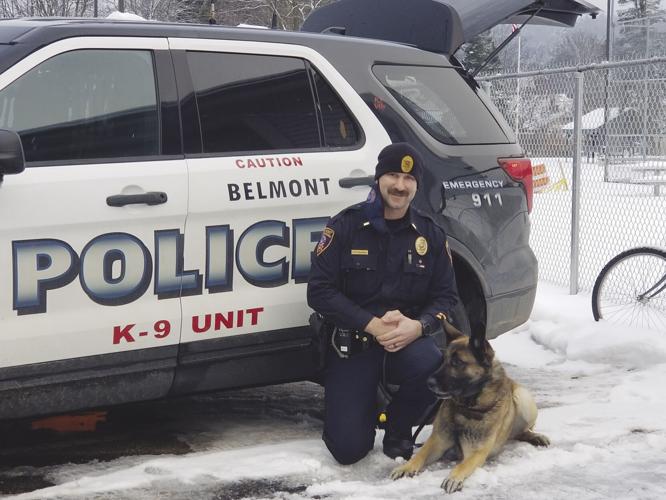
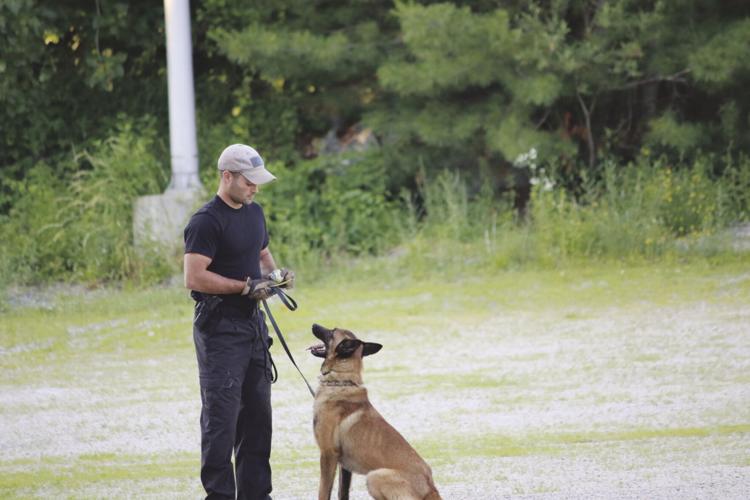
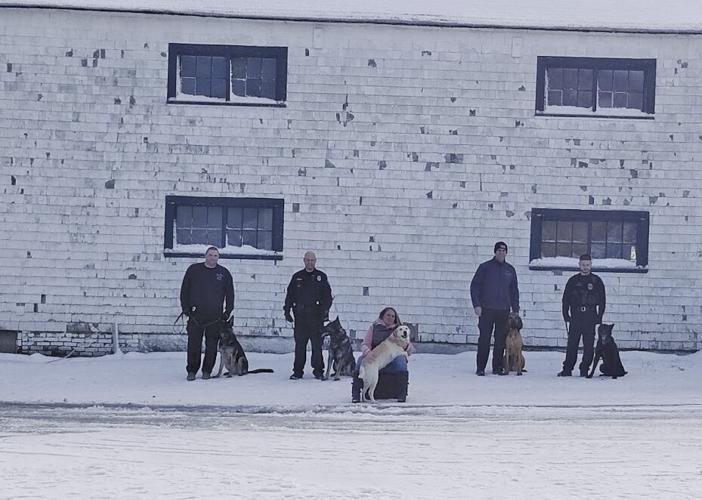
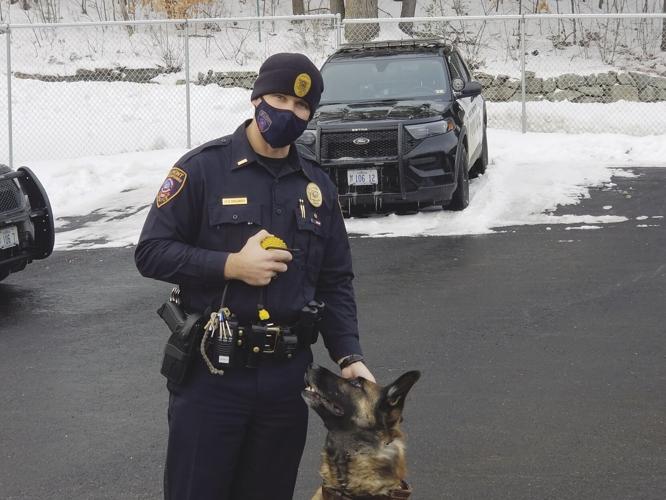
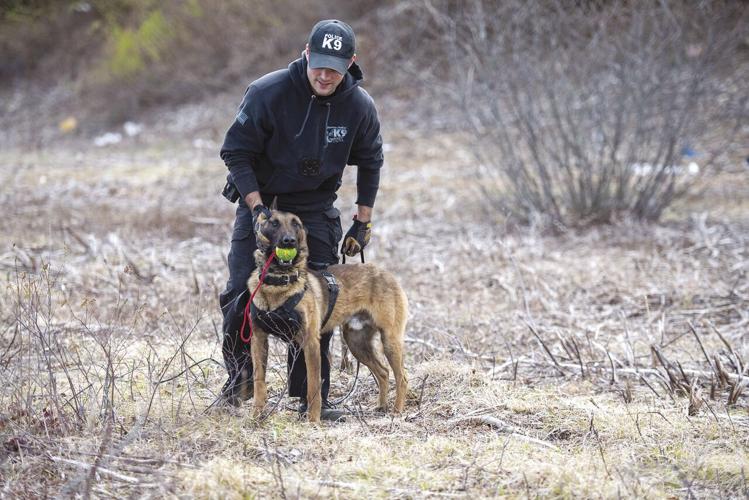
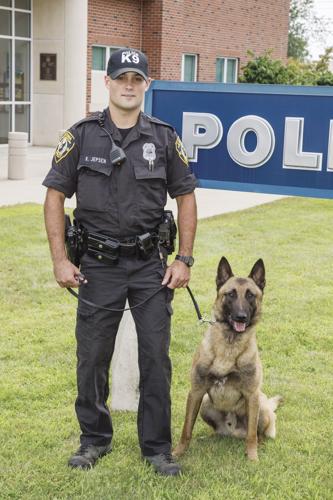
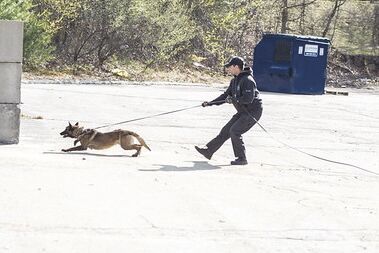











(0) comments
Welcome to the discussion.
Log In
Keep it Clean. Please avoid obscene, vulgar, lewd, racist or sexually-oriented language.
PLEASE TURN OFF YOUR CAPS LOCK.
Don't Threaten. Threats of harming another person will not be tolerated.
Be Truthful. Don't knowingly lie about anyone or anything.
Be Nice. No racism, sexism or any sort of -ism that is degrading to another person.
Be Proactive. Use the 'Report' link on each comment to let us know of abusive posts.
Share with Us. We'd love to hear eyewitness accounts, the history behind an article.